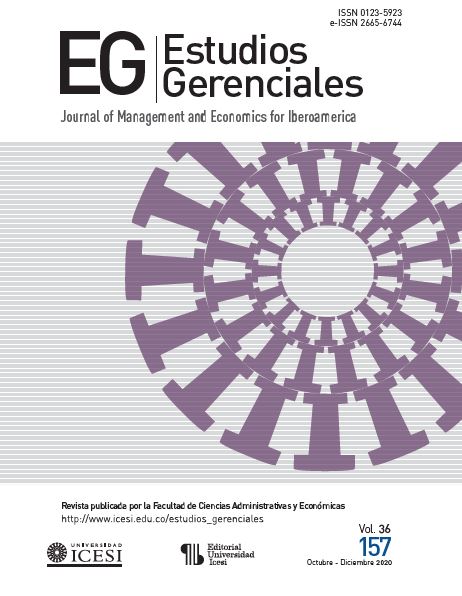Influence of the capital structure in the performance of Brazilian companies from a nonlinear perspective
DOI:
https://doi.org/10.18046/j.estger.2020.157.3851Keywords:
capital structure, economic performance, nonlinear influenceAbstract
The aim was to verify the influence of the capital structure on the economic performance of Brazilian industrial companies from a nonlinear perspective. The sample included 232 organizations listed in Brasil, Bolsa, Balcão (B3), with data from 1996 to 2017. The information was treated by statistical techniques, with emphasis on quadratic regression. The findings indicate that the ideal level of indebtedness to maximize the ROE is 35.78%, while to boost the ROA is 45.81%. Such results are consistent with the precepts of the trade-off theory. It was concluded that 1) linear models can lead to erroneous conclusions about the observed phenomenon, and 2) that corporate managers must observe with particular attention to the capital structure to maximize corporate performance according to the desired prism: ROE or ROA.
Downloads
References
Ahmad, Z., Abdullah, N. M. N., & Roslan, S. (2012). Capital Structure Effect on Firms Performance: Focusing on Consumers and Industrials Sectors on Malaysian Firms. International Review of Business Research Papers, 8(5), 137-155. https://doi.org/10.5430/ijfr.v10n6p78
Al-Najjar, B. (2014). Corporate Governance, Tourism Growth and Firm Performance: Evidence from Publicly Listed Tourism Firms in Five Middle Eastern Countries. Tourism Management, 42(1), 342-351. https://doi.org/10.1016/j.tourman.2013.09.008
Babalola, Y. A. (2012). The Effects of Optimal Capital Structure on Firms’ Performance in Nigeria. Journal of Emerging Trends in Economics and Management Sciences, 3(2), 31-133.
Babalola, Y. A. (2013). The Effect of Firm Size on Firms Profitability in Nigeria. Journal of Economics and Sustainable Development, 4(5), 90-94.
Banco Mundial (2018). World Development Indicators. Acesso em: 23 de maio de 2018: http://data.worldbank.org/indicator/NY.GDP.MKTP.KD.ZG
Bastos, D. D., Nakamura, W. T., & Basso, L. F. (2009). Determinantes da Estrutura de Capital das Companhias Abertas da América Latina: um Estudo Empírico Considerando Fatores Macroeconômicos e Institucionais. Revista de Administração da Mackenzie, 10(6), 47-77. https://doi.org/10.1590/S1678-69712009000600005
Benachenhou, A. (2013). Países Emergentes. Brasília: Fundação Alexandre de Gusmão.
Bhaduri, S. N. (2002). Determinants of Corporate Borrowing: Some Evidence from the Indian Corporate Structure. Journal of Economics and Finance, 26(2), 200-215. https://doi.org/10.1007/BF02755986
Chipeta, C., & Mcclelland, D. (2018). In search of conclusive evidence on the trade-off and pecking order theories of capital structure: Evidence from the Johannesburg Stock Exchange. Investment Analysis Journal, 47(1), 15-30. https://doi.org/10.1080/10293523.2017.1412608
Ebaid, I. El-S. (2009). The Impact of Capital-Structure Choice on Firm Performance: Empirical Evidence from Egypt. The Journal of Risk Finance, 10(5), 477-487. https://doi.org/10.1108/15265940911001385
Fávero, L. P., Belfiore, P., Silva, F. L. da, & Chan, B. L. (2009). Análise de dados - Modelagem Multivariada para Tomada de Decisões (2. ed.). Rio de Janeiro: Elsevier.
Harrison, B., & Widjaja, T. W. (2014). The Determinants of Capital Structure: Comparison Between Before and After Financial Crisis. Economic Issues, 19(2), 55-82.
Ismail, A., Cuong, N. T., Ahmad, N., & Hanif, R. (2014). Threshold-Effect of Leverage on Firm-Value: Evidence from Textile Sector of Pakistan. International Journal of Multidisciplinary Consortium, 1(3), 1-21.
Jaisinghani, D., & Kanjilal, K. (2017). Non-linear Dynamics of Size, Capital Structure and Profitability: Empirical Evidence from Indian Manufacturing Sector. Asia Pacific Management Review, 22(3), 159-165. https://doi.org/10.1016/j.apmrv.2016.12.003
Lee, S. (2011). How Financial Slack Affects Firm Performance: Evidence from US Industrial Firms. Journal of Economics Research, 16(1), 1-27.
Modigliani, F., & Miller, M. H. (1958). The cost of capital, corporation finance and the theory of investment. The American Economic Review, 48(3), 261-297. https://doi.org/10.2307/1809766
Modigliani, F., & Miller, M. H. (1963). Corporate Income Taxes and the Cost of Capital: a Corretion. The American Economic Review, 53(3), 433-443. https://doi.org/10.2307/1809167
Myers, S. C. (1984). The Capital Structure Puzzle. The Journal of Finance, 39(3), 575-592. https://doi.org/10.1111/j.1540-6261.1984.tb03646.x
Pamplona, E., Silva, T. P. da, & Nakamura, W. T. (2019). Influências da Folga Financeira no Desempenho Econômico de Empresas Industriais Brasileiras e Mexicanas. Estudios Gerenciales, 35(153), 399-415. https://doi.org/10.18046/j.estger.2019.153.3366
Parsons, C., & Titman, S. (2009). Empirical Capital Structure: a Review. Foundations and Trends® in Finance, 3(1), 1-93. https://doi.org/10.1561/0500000018
Pierce, J. R., & Aguinis, H. (2013). The too-much-of-a-good-thing Effect in Management. Journal of Management, 39(2), 313-338. https://doi.org/10.1177/0149206311410060
Rao, K. T. V., Joshi, B. P., & Khurana, I. (2017). Capital Structure Determinants: Empirical Evidence from Listed Manufacturing Firms in India. Pacific Business Review International, 10(4), 17-21.
Seo, K. (2016). Excessive Leverage and Firm Performance in Competitive Casino Markets. Tourism and Hospitality Research, 18(4), 498-504. https://doi.org/10.1177/1467358416671564
Soumadi, M. M., & Hayajneh, O. S. (2012). Capital Structure and Corporate Performance Empirical Study on the Public Jordanian Shareholdings Firms Listed in the Amman Stock Market. European Scientific Journal, 8(22), 173-189.
Supra, B., Narender, V., Jadiyappa, N., & Girish, G. P. (2016). Speed of Adjustment of Capital Structure in Emerging Markets. Theoretical Economics Letters, 6(3), 534-538. http://dx.doi.org/10.4236/tel.2016.63059
Wet, J. de. (2006). Determining the Optimal Capital Structure: a Practical Contemporary Approach. Meditari Accounting Research, 14(2), 1-16. https://doi.org/10.1108/10222529200600009
Published
Issue
Section
License
Articles are the sole responsibility of their authors, and will not compromise Icesi’s University principles or policies nor those of the Editorial Board of the journal Estudios Gerenciales. Authors authorize and accept the transfer of all rights to the journal, both for its print and electronic publication. After an article is published, it may be reproduced without previous permission of the author or the journal but the author(s), year, title, volume, number and range of pages of the publication must be mentioned. In addition, Estudios Gerenciales must be mentioned as the source (please, refrain from using Revista Estudios Gerenciales).








